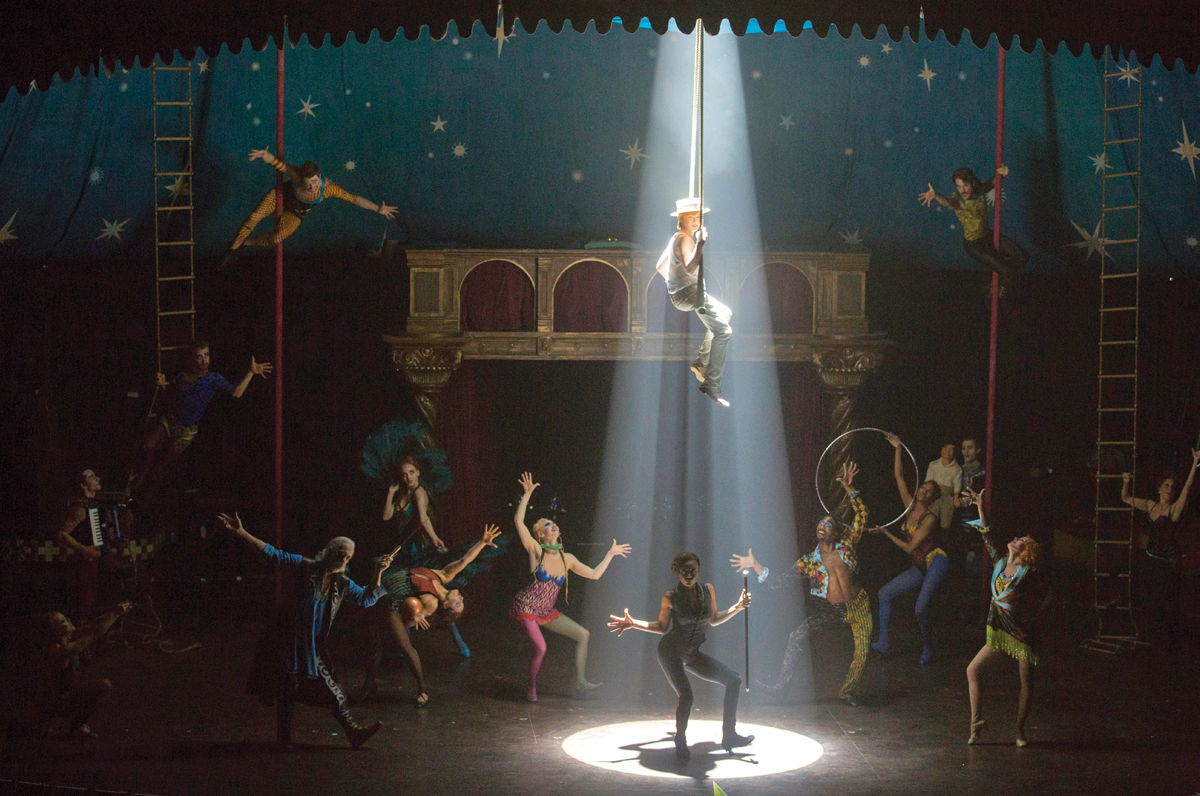Diane Paulus: Drama Queen

A scene from Paulus’s Pippin showcases a full range of circus performers. (Photograph by Michael J. Lutch)
Even during her freshman year at Harvard, in 1984, Paulus was a full-on fangirl of the ART’s unorthodox productions—especially the theater’s adaptation of Samuel Beckett’s Endgame. Set in a bombed-out subway station, the play caused a major stir when Beckett threatened to withhold rights for the production unless the ART agreed to include a statement from him in the program. It read, in part: “My play requires an empty room and two small windows. The American Repertory Theater production which dismisses my directions is a complete parody of the play as conceived by me. Anybody who cares for the work couldn’t fail to be disgusted by this.”
It was just this kind of controversy that had made the ART a beacon in the avant-garde theater world. For more than two decades, Robert Brustein, and then his handpicked successor, Robert Woodruff, built their theater on radical reinterpretations of the classics and collaborations with experimental directors. The two shared rigorous aesthetics and uncompromising attitudes, and they mounted iconic productions with luminaries like Robert Wilson, Andrei Serban, Julie Taymor, and JoAnne Akalaitis. “The ART completely exploded my mind,” Paulus says. To memorialize her passion, she stole a poster of Endgame from the Loeb Drama Center for her dorm. “It was the first example for me of, wow, you could actually do this with your life.”
Brustein was a towering figure in theater and one of Paulus’s early idols. He had founded the Yale Repertory Theatre in 1966, when he was dean of the School of Drama, and after his stormy ouster 13 years later—the university’s new president, Bartlett Giamatti (father of the actor Paul Giamatti) refused to renew his contract—Harvard invited him to bring his company to Cambridge. The American Repertory Theater opened in 1980, and through the years Brustein’s, and then Woodruff’s, esoteric productions brought acclaim.
Over the ensuing decades, however, theatergoers lost their patience for somber, challenging productions. Harvard, too, lost its patience with disappointing ticket sales. During the last two years of Woodruff’s tenure, the ART drew a total of nearly $4 million from its endowment to deal with revenue shortfalls, more than double the 4.5 to 5 percent typically used as a guideline for a nonprofit. Advisory board members began resigning. In January 2007, Sam Weisman, the Newton-based film director whose credits include George of the Jungle, told the Boston Globe that he felt he was constantly being asked to bail out the ART with donations, and blasted the theater as being too experimental: “I’m not interested in writing checks for a theater that nobody comes to,” he said.
A new approach was vital if the ART was to thrive, and in late 2006, after deciding not to renew Woodruff’s contract, Harvard launched a 16-month search for a new artistic director.
Paulus was a gutsy selection. A relative unknown, she’d never managed a theater company before. And though her academic credentials were stellar—she was a Phi Beta Kappa Harvard grad with a master’s degree in directing from Columbia and teaching stints at Yale—she presented a somewhat confusing mix of high and low theatrical offerings. She’d directed Così Fan Tutte for the Chicago Opera Theater’s opening of its 28th season. She’d also directed The Golden Mickeys, a revue-style show for the Disney Cruise Line designed as an awards ceremony that had cruise guests walking a red carpet into the ship’s theater while paparazzi furiously snapped their photos.
“She was not your grandmother’s ART,” says Paul Buttenwieser, who has sat on the ART’s board of trustees since 1984, and was a member of the selection committee. “She was go anywhere, do anything.”
Paulus describes her first five years at the ART as “incredibly intense.” It’s a cold autumn afternoon and she’s talking to me on the sofa in her light-filled Cambridge office, legs crossed, gaze steady, the picture of practiced politesse. Paulus set her sights on this job shortly after graduating from college, and she radiates the cool confidence of someone accustomed to getting what she wants. Colleagues call her driven, which seems clear enough. She’s also been called charismatic, a quality that she metes out more judiciously. Paulus looks more natural peering than smiling.
She shows me the purloined Endgame poster, which she has pulled from a stack of things leaning against the wall. Then she clutches it dramatically to her chest briefly before returning it to the pile. It’s been more than nine hours since she last ate, and she’s ravenous. When her assistant delivers lunch midway through our interview, Paulus tears into it while somehow maintaining her composure. Nancy Harrington, Paulus’s production stage manager and associate director on numerous shows, swears she’s never seen her tired.
Paulus is an avant-gardist in the tradition of Brustein and Woodruff, but instead of pursuing the abstruse and esoteric, she goes for the gut. She launched her debut ART season with an audacious statement of purpose in The Donkey Show, a disco-themed adaptation of A Midsummer Night’s Dream featuring half-naked go-go dancers, a boozed-up, booty-shaking audience (thanks to the full cash bar, located inside Oberon, the ART’s second stage), and not a word of Shakespeare. The production loudly and clearly declared where Paulus would take the ART: to the people. Her instincts were correct. During her first season at the ART, Paulus’s shows nearly doubled attendance for the theater.
She also spent that year on what she calls the campaign trail, going pretty much anywhere that would have her—the MOMS Club of Cambridge, Mount Auburn Hospital, countless living rooms—to talk about the theater. “Person after person after person would come up to me and shake my hand and say, ‘It’s great to meet you, but I just couldn’t take it anymore at the ART.’ And one by one by one I had to shake people’s hands and say, ‘I understand, that happens, but please come back.’” To that end, Paulus asked a lot of people a simple question: What do you want? “I have the most faith in an audience’s intelligence, in their appetite for work that stimulates and engages them, that makes them think and feel,” she explains.
But by the close of that first season, more than a dozen staffers had left and three high-profile board members, including Brustein, had resigned. A small but vocal band of critics began raising their voices, protesting the new director’s approach. Former ART actor Will LeBow wrote an open letter comparing Paulus’s first season to “a drug like cocaine.” Eileen McDonagh and Bob Davoli, who left the ART’s advisory board and board of trustees, respectively, reacted as if Paulus had turned the theater into a brothel, pronouncing how offensive and smutty they found her approach. “The problem as we see it is that you are destroying the heritage of the ART,” they wrote in a letter to Paulus, “by making it into something completely different—a place to preview musicals heading for Broadway, musicals in general, and sensory-saturated productions generating visceral experiences that often include pandering to sexual appetites.”
To the patrician departed who view music and sex as threats to their theater, Paulus says she simply wants to mirror the world we live in, creating dynamic interactions that deliberately dissolve the fourth wall and muddy the line between performer and spectator. She’d honed this attitude as a student at Harvard, where she examined the Living Theater—Julian Beck’s and Judith Malina’s influential company, which used spectacle and extreme forms of audience involvement as a means to confront complacency and spark social change.
Woodruff declined to be interviewed for this story, and Brustein, a senior research fellow at Harvard who has remained largely silent on the subject, offers a diplomatic assessment. “Diane Paulus has been a mesmerizing leader of the ART, and has created a number of really memorable productions,” he says. “I personally would have preferred less emphasis on pre-Broadway musical tryouts, and more on resident company work, but that’s a tempera mental difference.”

